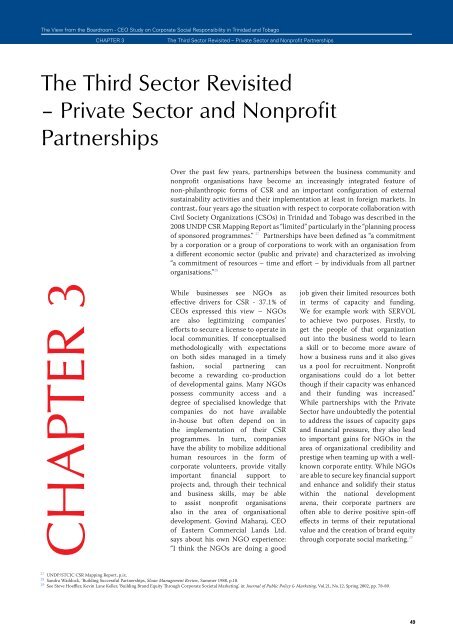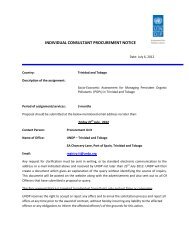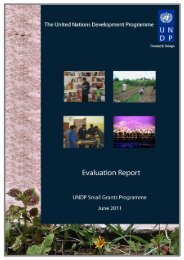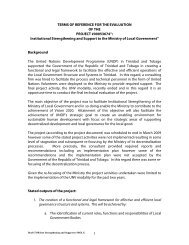The View from the Boardroom - UNDP Trinidad and Tobago
The View from the Boardroom - UNDP Trinidad and Tobago
The View from the Boardroom - UNDP Trinidad and Tobago
Create successful ePaper yourself
Turn your PDF publications into a flip-book with our unique Google optimized e-Paper software.
<strong>The</strong> <strong>View</strong> <strong>from</strong> <strong>the</strong> <strong>Boardroom</strong> - CEO Study on Corporate Social Responsibility in <strong>Trinidad</strong> <strong>and</strong> <strong>Tobago</strong>CHAPTER 3<strong>The</strong> Third Sector Revisited – Private Sector <strong>and</strong> Nonprofit Partnerships<strong>The</strong> Third Sector Revisited– Private Sector <strong>and</strong> NonprofitPartnershipsOver <strong>the</strong> past few years, partnerships between <strong>the</strong> business community <strong>and</strong>nonprofit organisations have become an increasingly integrated feature ofnon-philanthropic forms of CSR <strong>and</strong> an important configuration of externalsustainability activities <strong>and</strong> <strong>the</strong>ir implementation at least in foreign markets. Incontrast, four years ago <strong>the</strong> situation with respect to corporate collaboration withCivil Society Organizations (CSOs) in <strong>Trinidad</strong> <strong>and</strong> <strong>Tobago</strong> was described in <strong>the</strong>2008 <strong>UNDP</strong> CSR Mapping Report as “limited” particularly in <strong>the</strong> “planning processof sponsored programmes.” 27 Partnerships have been defined as “a commitmentby a corporation or a group of corporations to work with an organisation <strong>from</strong>a different economic sector (public <strong>and</strong> private) <strong>and</strong> characterized as involving“a commitment of resources – time <strong>and</strong> effort – by individuals <strong>from</strong> all partnerorganisations.” 28CHAPTER 3While businesses see NGOs aseffective drivers for CSR - 37.1% ofCEOs expressed this view – NGOsare also legitimizing companies’efforts to secure a license to operate inlocal communities. If conceptualisedmethodologically with expectationson both sides managed in a timelyfashion, social partnering canbecome a rewarding co-productionof developmental gains. Many NGOspossess community access <strong>and</strong> adegree of specialised knowledge thatcompanies do not have availablein-house but often depend on in<strong>the</strong> implementation of <strong>the</strong>ir CSRprogrammes. In turn, companieshave <strong>the</strong> ability to mobilize additionalhuman resources in <strong>the</strong> form ofcorporate volunteers, provide vitallyimportant financial support toprojects <strong>and</strong>, through <strong>the</strong>ir technical<strong>and</strong> business skills, may be ableto assist nonprofit organisationsalso in <strong>the</strong> area of organisationaldevelopment. Govind Maharaj, CEOof Eastern Commercial L<strong>and</strong>s Ltd.says about his own NGO experience:“I think <strong>the</strong> NGOs are doing a goodjob given <strong>the</strong>ir limited resources bothin terms of capacity <strong>and</strong> funding.We for example work with SERVOLto achieve two purposes. Firstly, toget <strong>the</strong> people of that organizationout into <strong>the</strong> business world to learna skill or to become more aware ofhow a business runs <strong>and</strong> it also givesus a pool for recruitment. Nonprofitorganisations could do a lot betterthough if <strong>the</strong>ir capacity was enhanced<strong>and</strong> <strong>the</strong>ir funding was increased.”While partnerships with <strong>the</strong> PrivateSector have undoubtedly <strong>the</strong> potentialto address <strong>the</strong> issues of capacity gaps<strong>and</strong> financial pressure, <strong>the</strong>y also leadto important gains for NGOs in <strong>the</strong>area of organizational credibility <strong>and</strong>prestige when teaming up with a wellknowncorporate entity. While NGOsare able to secure key financial support<strong>and</strong> enhance <strong>and</strong> solidify <strong>the</strong>ir statuswithin <strong>the</strong> national developmentarena, <strong>the</strong>ir corporate partners areoften able to derive positive spin-offeffects in terms of <strong>the</strong>ir reputationalvalue <strong>and</strong> <strong>the</strong> creation of br<strong>and</strong> equitythrough corporate social marketing. 2927 <strong>UNDP</strong>/STCIC CSR Mapping Report, p.ix.28 S<strong>and</strong>ra Waddock, ‘Building Successful Partnerships, Sloan Management Review, Summer 1988, p.18.29 See Steve Hoeffler, Kevin Lane Keller, ‘Building Br<strong>and</strong> Equity Through Corporate Societal Marketing’, in: Journal of Public Policy & Marketing, Vol.21, No.12, Spring 2002, pp. 78-89.49
















